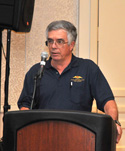 Paulding County Regional airport;
Paulding County Regional airport;
Photo courtesy of David Tulis.
Paulding County Regional airport just opened in November, but its promising future as a major general aviation reliever airport for Atlanta Hartsfield could be threatened by the proposed Large Aircraft Security Program (LASP), AOPA Airport Support Network volunteer John F. Betsill Jr. testified last week.
The Transportation Security Administration’s (TSA’s) proposed security program targets aircraft weighing more than 12,500 pounds—the very aircraft and operators that would likely be attracted to Paulding County Regional. The airport is the first jet-capable facility to be built in Georgia in more than 30 years.
The plan would require criminal history record checks for crew members, matching passengers to TSA watch and no-fly lists, checking passengers and baggage for dangerous weapons or prohibited items, and paying for biennial third-party audits.
The goal of having Paulding County Regional become a major GA reliever airport “will be more difficult to attain by applying airline security standards to individual aircraft owners and under Part 91,” said Betsill in his testimony during a TSA public hearing Jan. 8 in Atlanta. About 250 people attended the meeting, with 60 testifying on the impact the proposed rule would have on their flight operations and businesses.
 John F. Betsill; Photo courtesy of National Business Aviation Association.
John F. Betsill; Photo courtesy of National Business Aviation Association.
Betsill explained that the proposal doesn’t take into account the inherent differences between commercial and private operations and inquired as to why the joint AOPA-TSA Airport Watch Program couldn’t achieve the same level of security.
Under the current LASP proposal, 312 airports would be affected. AOPA’s fear is that security officials would later try to expand the program to the more than 4,300 public-use airports across the United States, including Paulding County.
“Paulding County Regional Airport has the potential to enhance the economic development of Paulding County and the surrounding area,” Betsill said. “That potential will be curtailed by imposing costly and burdensome operations requirements on aircraft owners and operators.”
 Paulding County Regional airport;
Paulding County Regional airport;
Photo courtesy of David Tulis.
In addition, Betsill echoed AOPA’s concerns about the proposal, including the unprecedented intrusion of regulation on GA, the lack of justification for setting the weight requirement at 12,500 pounds, the fear that the proposal could be expanded to all airports and GA aircraft, and the alarming requirement that aircraft operators must pay for third-party audits—unsubsidized payments for an outsourced governmental function. Regarding the third-party audits, AOPA believes the government should pay for the service instead of the operator. The association also is concerned that a system for auditor accountability has not yet been developed.
During the meeting, the TSA advised attendees that the proposed rules did not apply to foreign-registered aircraft.
“Everyone in attendance was shocked,” said AOPA Vice President of Security Craig Spence. “The fact that foreign registered aircraft will not be covered is further evidence that the TSA has missed the mark and calls into question any justification for the rule.”
AOPA is working to find out what’s behind the TSA’s reasoning.
More public meetings about the LASP are scheduled for: Jan. 16 in Chicago; Jan. 23 in Burbank, Calif.; and Jan. 28 in Houston. AOPA encourages members to attend the meetings and voice their concerns about the proposal. See the public notice for meeting details.
Even if you can’t make it in person, you can still make your voice heard by submitting your written comments using AOPA’s member action center.

